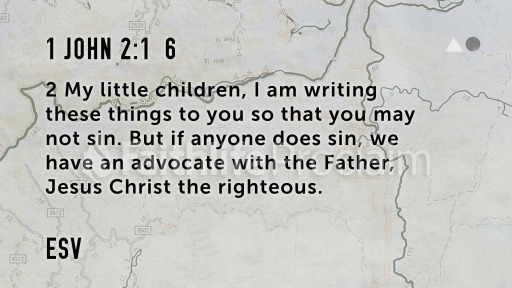The Righteous Sinner: How Jesus Gives Righteousness

Notes
Transcript
Sermon Tone Analysis
A
D
F
J
S
Emotion
A
C
T
Language
O
C
E
A
E
Social
Scripture Reading: 1 John 2:1-6
Opening Prayer
Introduction
A
Exposition 1
1 My little children, I am writing these things to you so that you may not sin. But if anyone does sin, we have an advocate with the Father, Jesus Christ the righteous. 2 He is the propitiation for our sins, and not for ours only but also for the sins of the whole world.
"My little children” -
An affectionate greeting to those who are still “under” his leadership and oversight
Why is he writing what he is writing?
The book - Ch. 1 Vs. 4, so that our joy may be complete
This passage - so that you may not sin
So, do you sin?
Yes
Then what?
next words, But if anyone does sin
Christ (God the Son) is our “advocate” with God the Father
Reminder, He is righteous
Propitiation - lit. the sacrifice for sin (word is only used twice in bible)
He is our substitute, therefore “covering” our sin and reconciling our relationship to God
He covers “our” sin
whose?
John’s and the original readers
But also for the sins of the whole world
This is going to be a little break as we explore the meaning of this.
There is a question as to the extent of what Jesus is paying for in His atoning death
If you read this without any other context of Scripture it seems to be saying that Jesus died to redeem every man woman and child that has ever lived or ever will be born.
Yet, it this is the case, why does John speak of people who are yet lost in sin?
Let us illustrate it this way
McDonalds illustration
Possible explantions
Jews/Gentiles
We = apostles or John still
We = John and the original readers
The whole world signifies the boundaries of the Gospel
Similar to Jews Gentiles but accounts for the mixed nature of the church in Ephesus
In other words, John means the Christ is the only hope for the world. He is making a point for exclusivity rather than universality.
I. Don’t sin, but when you do, know that Jesus keeps you in Him (1-2)
I. Don’t sin, but when you do, know that Jesus keeps you in Him (1-2)
In other words, the same Gospel that saves you keeps you saved
We need Jesus to come to God and we need Jesus to stay with God and the Good News covers both
Please also realize that this exclusivity “excludes” other God’s....
Exposition 2
3 And by this we know that we have come to know him, if we keep his commandments. 4 Whoever says “I know him” but does not keep his commandments is a liar, and the truth is not in him, 5 but whoever keeps his word, in him truly the love of God is perfected. By this we may know that we are in him: 6 whoever says he abides in him ought to walk in the same way in which he walked.
When we “know” God, we are in covenant with Him
This is a contractual relationship
God bought us and we will obey
What if you don’t?
v. 4 - you don’t really know him
This doesn’t mean that your works keep you saved but rather that one who belongs to God keeps His commandments, period.
v. 5, whoever keeps His Word, the Love of God is perfected in him”
what does this mean
Is this referring to God’s Love of us or our love of God? Both options are grammatically correct.
Either God’s Love for us has the goal of transforming us
or
Our Love for God results in our transformation
I think the later makes the most sense here but either way, it doesn’t really change the overall meaning of the text here.
5b-6. We follow Jesus example (walk as He walked) and this lets us know!
II. If you are kept by Jesus, you will obey Jesus, and this gives assurance (3-6)
II. If you are kept by Jesus, you will obey Jesus, and this gives assurance (3-6)
Not legalism
Instead, goodness by grace
Conclusion
Know Jesus
Follow Jesus
Find your sin
Flee from sin
